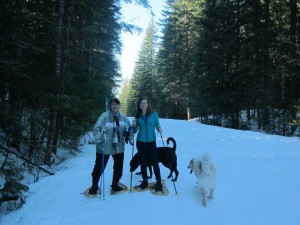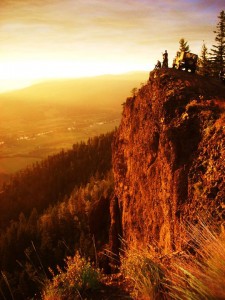So, as some of you know, I currently live and grew up in a really small town and have never really lived in a city larger than Williams Lake, and even then I lived 5 minutes outside of town. Perhaps due to this reason, I still live in a small town with my 100lb dog Buster. My drive is just over an hour each way to school so if I have class at 9:30 in the morning, I have to leave by 8:00. It is also much more expensive in the long run as I pay rent in Enderby plus I generally put around 800km on my car every week.
To many of you this sounds crazy, but for me it just seems to make sense. The city honestly scares me. It is busy and crowded. I get stressed out just entering the city sometimes, to be completely honest, I get stressed just going to Walmart as there are so many people there and all in a hurry. The funny thing about this is that a lot of my friends from home feel the same way and those that have moved to cities said that it took them a long time to adjust.
Small towns in my opinion have so much going for them, especially if larger centers are easily accessible for shopping and cultural activities. There is a wealth of community feeling in small towns. I know most of my neighbors and even many strangers in the grocery store smile and say hi.
A while ago in class (September 27th) we talked about the Crisis of the 19th century and the reason for planning movements that attempted to ameliorate the conditions of the cities by introducing elements of the country. At that time the London slums were becoming a worry to the middle class. They were afraid that the poor members of these slums would rise up in revolution so they attempted to make living conditions better. Georg Simmel believed that the city caused over-stimulation and thus nervous exhaustion. There is also an idea of an intensification of urban stimuli where noise leads to feelings of indifference not caring about anything.
Although in some ways the city has gotten so much better, it has also gotten worse in some ways. Cities have grown far larger than the cities of the 19th century and thus they have different sets of problems, including my personal nemesis, traffic! Planners of the 20th century have tried to address the sets of problems that stem from the sheer magnitude of cities, but to a person who has lived only in small towns; cities are still scary, loud, busy places that as Simmel says create nervous over-stimulation and exhaustion.
I know that there is a completely different viewpoint to this, and that life in a really small town is unthinkable to many who grew up exclusively in a city, or have grown accustomed to the society and culture that the city encompasses.




Liz,
I too have lived in a small town (Williams Lake, way up on Fox Mountain) but have a completely different stance than yourself. I love the city and have no interest in returning to a small town! Driving to Vancouver, being overwhelmed by the massive amounts of people and activities occurring constantly around you is my passion. I love the anonymity where nobody is constantly watching my actions and making judgements because even if they do, rarely will I see them again or interact with them. I like the ability to head out of the city for an escape to the country (snowboarding, cliff jumping, you name it!) and immersing myself in the outdoors, but I appreciate it more because it’s an escape. I crave to travel to the largest metropolises which force you to constantly be on alert and aware of your environment because change happens more quickly.
I suppose I like to keep my countryside and my city completely separated so that I can escape and travel between the two. Do you like cities that have a Hinterland not too far away? Is your ideal settlement on the outskirts, completely isolated, or something similar to urban sprawl with communities?
I find it interesting how this thread really echoes the Ebenezer Howard vs. Jane Jacobs debate (although hardly a debate because Howard could not defend himself when Jacobs attacked him!) Jacobs called Howard a “city-hater” and while I don’t think that’s fair – he tried to accomplish a synthesis of city and country – she has a point in that he believed people wanted to live in quiet places in contact with nature; they could seek the bustling city life when they felt like it, on occasion. Some comments that Jacobs makes, on the other hand, makes her sound like a hater of small towns, which she sees as claustrophobic and even coercive. I think an interesting third way of looking at things is to look at European towns, which are small and embedded in their hinterland, and yet have a vibrant cultural life and commercial centers. Germany and Italy in particular have a lot of towns like this (although these days they are kept alive as much by tourism as by from their own activities.)
Beautiful photos, btw!
I’ve thought a lot about this debate too. There are elements of both the small town and the big city that I desire in my daily life, most of which you both highlighted. I like my sense of community, knowing you are connected to someone else, but at the same time I will seek out moments of solitude and anonymity. I enjoy cultural amenities, but I also want the opportunity to explore the natural land. I like the idea of using the power of modern technology for the betterment of the physical environment and daily life, but any power without thoughtful control can be dangerous and detrimental. These are things I’ve thought about a lot before this class, just not necessarily in the context of urban planning, which seems strange to me now.
At what level is this debate relative to personal preference or symbolic of larger social patterns?
Is it that some individuals desire two different living environments and as a result, the small town community has continued to survive alongside the thriving, developing modern big city? Or do these two living environments and the tension between them form the precipice of a paradigm shift?
My favourite aspect of history is to engage with the human elements and see how they relate to my position in the contemporary state of affairs. So, having discussed the ways that the surrounding and shifting context influenced urban planners and their ideologies, what do our contemporary criticisms or commendations of the city, or the town, say in regards to our context and the ways in which it might be shifting?
I believe that everyone has their own preference, as shown by Jessie’s desire to live in a city with the amenities of nature within a short grasp, and in contrast with Liz’ preference to live in a small town where she feels there is a stronger sense of community. I believe that our personal preferences are shaped by the environment in which we are brought up, by our current motivations and individual personalities, and how we negatively or positively perceive these experiences.
For example, if you would like to live an individualistic life, away from people and in isolation you have the option to go hide in a cabin in the wilderness or to lock yourself in an apartment in downtown Toronto. If you crave a sense of community it is both available in small towns and in larger cities; it is up to you to make new relationships and bonds with people that share similar hobbies or outlooks as you.
I believe that people in contemporary society are constantly shifting in both directions. People are seeking to move away from rural areas to urban centers for as many reasons as people are trying to get away. It is completely based on your own judgement, life experiences, and current goals or motivations.
My personal preference is to not live in a really small community that does not have the amenities that are offered in larger settlements, but to also stay away from chaotic centers like Vancouver. I chose to live in Kelowna because I feel as though it is a middle ground between town and country.
When I first moved to Kelowna I for sure felt the same way you do about big cities, I grew up in Armstrong which as of course you will know is also a small town. I loved it there, I knew lots of people, and it was easy to quickly meet up for hangouts. That is my main problem with the big city is how long it takes to get anywhere, it is often an inconvenience that I did not have in Armstrong.
Now that I have lived in Kelowna for over a year, I can see some benefits that the big city has, such as anonymity and being close to products and things of that nature, but also many of its downsides (such as your example of traffic). I am still not sure which I like more as I feel I have not lived in Kelowna large enough to figure that out, though I do know that anything bigger than Kelowna would not be something I would like.
PS. Love your pictures, the Enderby cliffs are awesome and its a fun hike to get up there.
I knew that there would be different views on this topic which is part of the reason that I decided to post on this. I believe it is an unwinnable debate as it is one on personal preferences. Over the course of this semester we have approached this topic from many different angles but there has not been and will not be a universal consensus on this topic. I really loved reading all of the comments which were posted as it gave me insights into both sides of the debate.